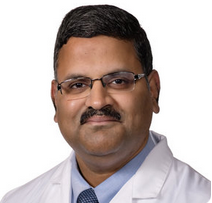Atul Khasnis, MD, MS

Atul Khasnis, MD, MS, is a rheumatologist specializing in vasculitis at Piedmont Clinic in Georgia. He completed his VCRC Fellowship (2009-2011) at the Cleveland Clinic, with Carol A. Langford, MD, MHS, as his mentor, and post-fellowship was an assistant professor at Case Western Reserve University and rheumatology faculty at the Cleveland Clinic for three years. Dr. Khasnis is a member of the Vasculitis Foundation Scientific and Advisory Committee and the American College of Rheumatology.
This interview with Dr. Khasnis was conducted by the Vasculitis Foundation, November 2011.
Growing up in Mumbai, India, Atul Khasnis knew he wanted to pursue a career in biology. When he wasn’t playing in cricket matches and table tennis games, he eventually decided to focus on human biology and become a medical doctor.
“I found biology very fascinating in terms of its complexity and my ability to relate to its concepts,” he recalls.
Course of Study
After graduating with an MBBS and MD in internal medicine from the University of Mumbai, Khasnis completed an internal medicine residency at Michigan State University, followed by a two-year fellowship in rheumatology and a two-year fellowship in vasculitis offered by the Vasculitis Clinical Research Consortium at the Cleveland Clinic.
“I wanted to pursue a specialty that included diseases affecting multiple organ systems, was closely linked to internal medicine and required a comprehensive approach to diagnosis and treatment -- a combination of presenting symptoms, physical exam findings and laboratory or imaging tests,” he says.
Focus on Immunology
Vasculitis fit the bill. Khasnis’ research focuses on immunosuppressive medications that are effective but can be pretty toxic to patients. This creates a need for studies that can contribute to evidence-based guidelines for monitoring to maximize medication safety. His thesis project (for a master’s in clinical research) was one step in that direction.
“It involved comparing the cost effectiveness of weekly versus monthly white blood cell (WBC) measurements in preventing low WBC counts and consequent complications such as severe infection in patients with granulomatosis with polyangiitis (Wegener’s) on Cytoxan,” he explains. “Cyclophosphamide (Cytoxan) -- is an immunosuppressive medication commonly used to treat patients with severe vasculitis,” he says. “One of the major toxicities of this medication is its suppressive effect on the bone marrow especially with prolonged or repeated use, which can lead to decrease in white blood cell counts. Since WBCs are key cells in fighting infection, a critically low WBC counts increases risk of serious infection.”
Different Presentations
Khasnis says the biggest challenge he faces is how differently these diseases present in each patient. “Diagnosing these diseases is therefore challenging when early in the course. Also, there are no laboratory tests that absolutely establish a diagnosis, making it necessary to evaluate the full patient.”
But meeting that challenge makes for a fulfilling career. “Most vasculitic diseases are treatable, not curable,” he continues. “Patients are significantly distressed by the impact of these illnesses on their quality of life. Helping them understand their illness and treating them with a goal to try and restore an acceptable quality of life and function is the most rewarding part.”
Patients and Research
Also rewarding: Working with the VF, which Khasnis says is critical for patients and researchers. “The Vasculitis Foundation forms a core medium for education of patients with these rare diseases,” he notes. “It provides them with up-to-date information about ongoing research and newer therapies. It therefore allows them to get involved in research. Patients with a diagnosis of a rare vasculitic disease yearn to share their journey with their illness and learn from the experiences of others who have experienced a similar illness. The Vasculitis Foundation provides them with an invaluable opportunity to do this which patients are extremely grateful for.”
Looking forward, Khasnis expects the next big development in research will be a translational immunology network to understand the underpinnings of these diseases.

